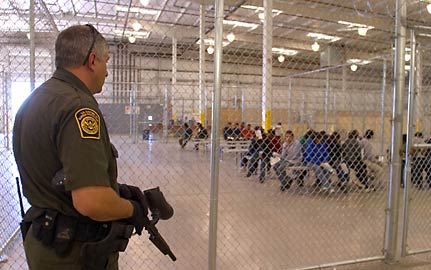Advocates Portray Effects of Militarization on Border Communities, Promote Greater Oversight, Accountability for Border Agents
FOR IMMEDIATE RELEASE
CONTACT:Tom Hargis, Director of Communications, ACLU of Texas, 832.291.4776; [email protected]
Ricardo Favela, Communications Director, SBCC, 760.659.3620; [email protected]
McAllen – Nearly 20 civil and human rights advocates in the Lower Rio Grande Valley met in an off-the-record meeting with the Deputy Secretary of the U.S Department of Homeland Security (DHS) yesterday and pushed for greater oversight and accountability for federal agents operating along the U.S.-Mexico border.
Deputy Secretary Alejandro Mayorkas, along with another representative from DHS and two from U.S. Customs and Border Protection (CBP), heard first-hand accounts of the detrimental and harmful effects on border communities of increased militarization and excessive use of force by federal agents in the name of border security. The CBP is an arm of DHS.
“Border policy must improve accountability and oversight out of respect for the 15 million border residents who call this region home,” said Astrid Dominguez, advocacy coordinator with the American Civil Liberties Union (ACLU) of Texas, which recently filed two, separate suits against border agents for excessive use of force against a Brownsville resident and invasive cavity searchesof a New Mexico resident. “We are delighted that Deputy Secretary Mayorkas listened to our concerns and expressed interest in a constructive dialogue moving forward.”
“The border is more than a line, it is a region that is home to families and businesses, it is a cornerstone of our economy, and it is a vibrant, sacred, and unique space that must be valued as a whole,” said Michael Seifert with the Equal Voice Network. “Border communities want revitalization, not militarization.”
The federal government spends $18 billion a year on border security, more than on the FBI, ATF, U.S. Marshals, DEA, and secret service combined.
The Southern Border Communities Coalition (SBCC) helped coordinate and broker the meeting with DHS, which included representatives from the ACLU of Texas, the Rio Grande Valley Equal Voice Network, and others. SBCC brings together more than 60 organizations from San Diego, California, to Brownsville, Texas, to ensure that border enforcement policies and practices are accountable and fair, respect human dignity and human rights, and prevent the loss of life in the region.
Stay Informed
Sign up to be the first to hear about how to take action.
By completing this form, I agree to receive occasional emails per the terms of the ACLU’s privacy statement.
By completing this form, I agree to receive occasional emails per the terms of the ACLU’s privacy statement.

